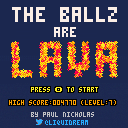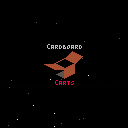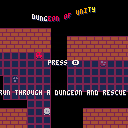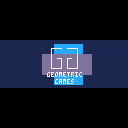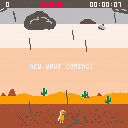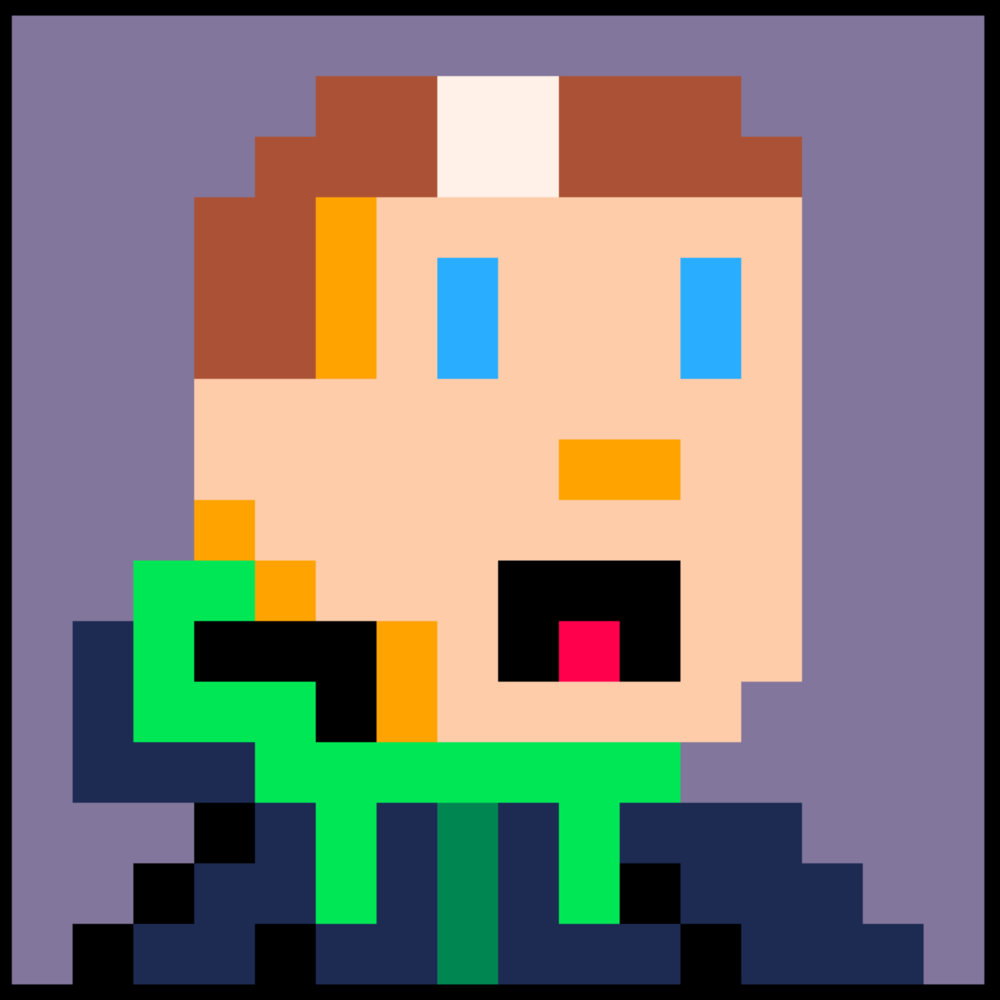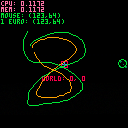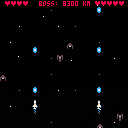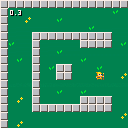@zep:
Any chance we could get the added value back from add(t,v)? I ask because it would simplify code a lot of the time. For example, I have a job manager I'm playing with that has a function like this:
function job_call( cor )
local job = { cor=cor, is_call=true }
add( _jobs, job )
return job
end
|
If add(t,v) returned v, I could write it like this:
function job_call( cor )
return add( _jobs, { cor=cor, is_call=true } )
end
|
Nicer, right? Cleaner, fewer tokens. I think that even lets the compiler implement it as a tailcall.
I know it's just a minor thing, but quality-of-life stuff like this can be really nice to have. (Kinda like built-in is_empty(t), cei(f), or sincos(a) would be, among others, wink, wink, nudge nudge.)
What do you say? I can't think of any way it would break backwards compatibility. Please? :)

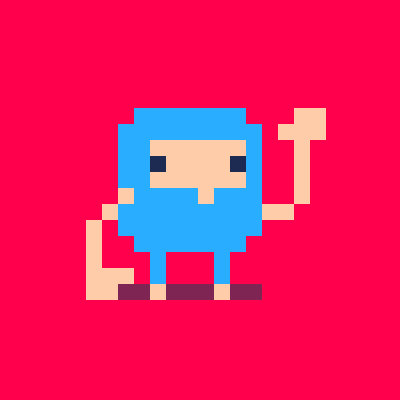
function arc(x, y, r, angle, c) if angle < 0 then return end for i = 0, .75, .25 do local a = angle if a < i then break end if a > i + .25 then a = i + .25 end local x1 = x + r * cos(i) local y1 = y + r * sin(i) local x2 = x + r * cos(a) local y2 = y + r * sin(a) local cx1 = min(x1, x2) local cx2 = max(x1, x2) local cy1 = min(y1, y2) local cy2 = max(y1, y2) clip(cx1, cy1, cx2 - cx1 + 2, cy2 - cy1 + 2) circ(x, y, r, c) clip() end end |
This function draws an arc by drawing a circle four times with different clipping regions.
Limitations:
- Can't draw a filled arc (but you can change the circ to a circfill for an interesting effect!)
- Can't set starting angle (but this would probably be easy to implement)
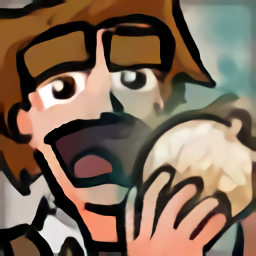


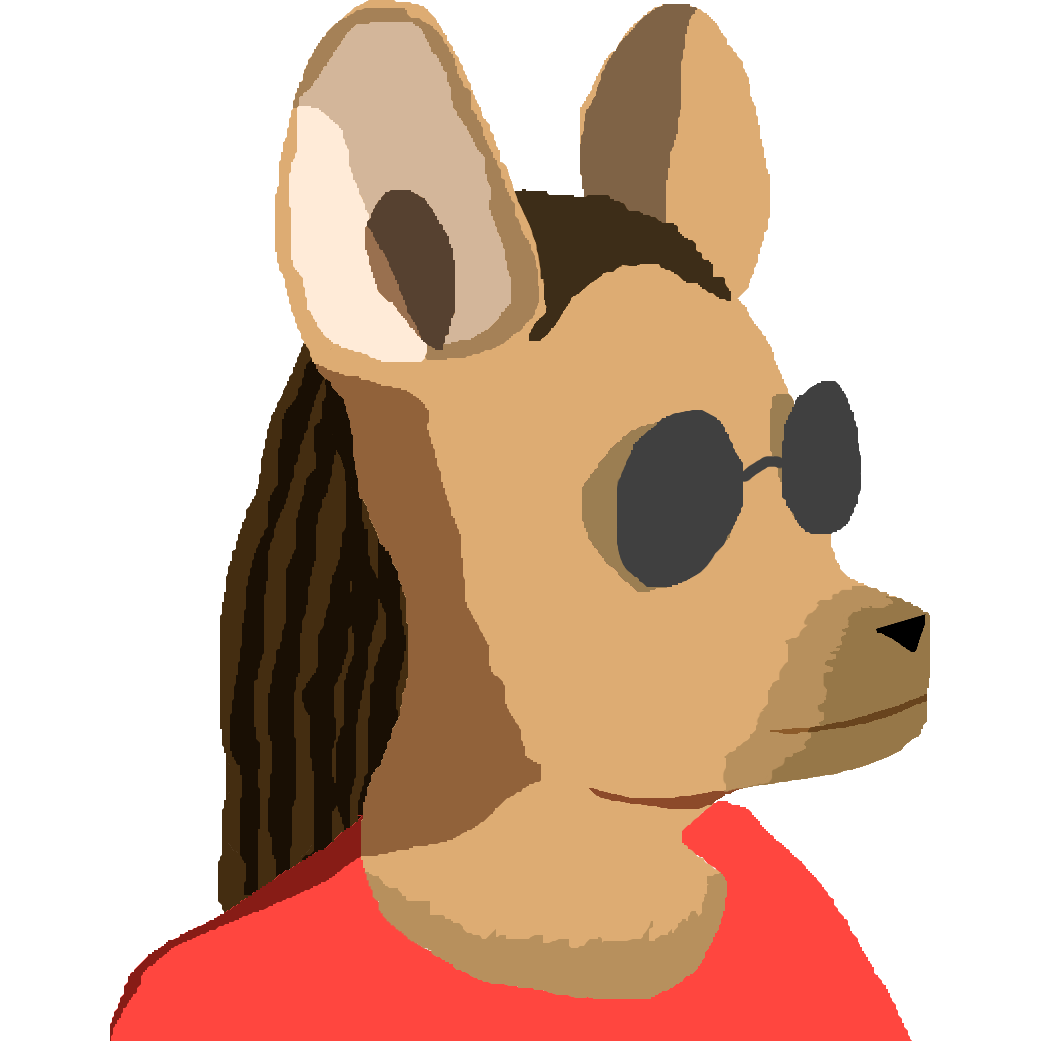
I made this game for the Game Maker's Toolkit Game Jam on itch.io.
The theme was Downwell's Dual Purpose Design. In this game you can only move by dive kicking. I ran out of time to implement enemies, but the dual purpose would be attack and movement. The dive kick button is the same as the jump button as well.
Press Left or Right to face left or right on the ground. Press either of the X or O buttons (Z, X on keyboard) to Jump from the ground. While in the air, press the same button to dive kick.
Thanks to @MBoffin on here and twitter for the code for the camera movement!
Hello y'all,
I'm working on making a puzzle game, and I've come across a problem with the collision detection/map reading when I try to change to the next map. I think this stems from the fact that I'm missing a concept somewhere on how maps work. Everything seems to work find until I move to the third map...not sure what I'm missing.
--sprite 0 is blank
--sprite 1 is player
--sprite 2 is to mark where the player spawned
--sprite 16 is wall
function _update()
moveplayer()
solidstuff()
end
function _draw()
cls()
map(0,0,0,0,16*3,16)
spr(1,player.x,player.y,1,1,0,false)
camera(cel_x*8,cel_y*8)
end
function moveplayer()
--moving player
if btnp(0,0) and solid.li!=16 and solid.lf!=16
then player.x-=player.dx
end
if btnp(1,0) and solid.ri!=16 and solid.rf!=16
then player.x+=player.dx
end
if btnp(3,0) and solid.di!=16 and solid.df!=16
then player.y+=player.dy
end
if btnp(2,0) and solid.ui!=16 and solid.uf!=16
then player.y-=player.dy
end
--switches the map
if btnp(5,0)
then cel_x+=16 readmap() player.x+=16*8
end
if btnp(4,0)
then cel_x-=16 readmap() player.x-=16*8
end
end
function readmap()
for x=0,15 do
for y=0,15 do
tile=mget(x+cel_x,y+cel_y)
if tile==1
then mset(x+cel_x,y+cel_y,2) player.x=x*8 player.y=y*8
end
end
end
end
function solidstuff()
solid.di=mget(flr((player.x)/8),flr((player.y+8)/8))
solid.df=mget(flr((player.x+7)/8),flr((player.y+8)/8))
solid.ui=mget(flr((player.x)/8),flr((player.y-8)/8))
solid.uf=mget(flr((player.x+7)/8),flr((player.y-8)/8))
solid.li=mget(flr((player.x-1)/8),flr((player.y)/8))
solid.lf=mget(flr((player.x-1)/8),flr((player.y)/8))
solid.ri=mget(flr((player.x+8)/8),flr((player.y)/8))
solid.rf=mget(flr((player.x+8)/8),flr((player.y)/8))
end
function _init()
player={}
player.x=8 player.y=8
player.dx=8 player.dy=8
solid={}
solid.di=0 solid.df=0
solid.ui=0 solid.uf=0
solid.li=0 solid.lf=0
solid.ri=0 solid.rf=0
cel_x=0 cel_y=0
tile=0
readmap()
end
|
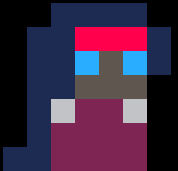

I guess this is as "done" as it's going to get, it's playable so that's good!
Made this in a couple of hours about a day trying to learn Lua and to get my OO brain around making things like this
Hopefully I'll revisit it once I'm better and make it decent, but for now I'm happy with it as my first tiny PICO-8 project
(I honestly have no clue what the icons are - they all started off trying to be something like a gem but I quickly realised that I can't do much in 8x8 pixels)
My highest score's 424, what's yours?
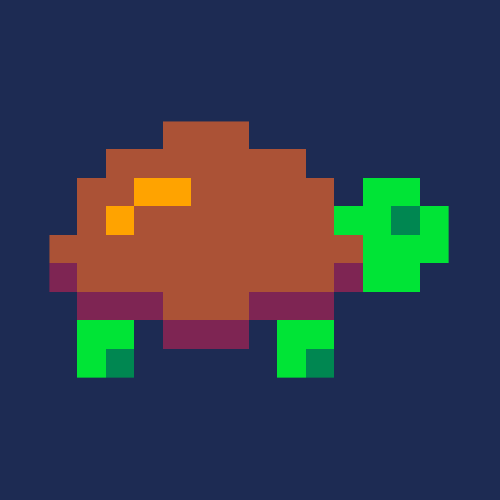
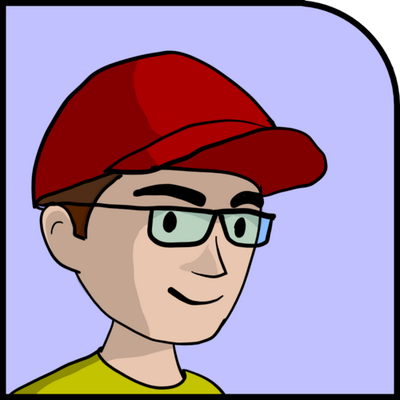
Hi everyone,
I am writing, for pure fun, a small shoot'em'up.
I would like to do things the "right way".
What tutorials / readings do you suggest to implement main topics:
ship movement / projectile & enemy movement?
I've already implemented a very basic version of movement simply adding to x or y if the player is pressing a button but then I thought...
I need also acceleration in order to enable power ups...
Same problem will be with enemy waves (acceleration, rotation, specular patterns).
How should I proceed?
Is there any book to read or tutorial or article about those topics?
Really thanks :)



Hi everyone!
I would like to be able to use my games from Android browser.
I know that this is possible because I saw a few games doing it.
I am using latest PICO-8 version but, if I export to html, this is not working:
http://www.davidenastri.it/engioi
Thanks for your time and help :)



Hello,
Apologies, I am very new to this.
I'm making an old-school dungeon crawler, and I want to store info for each floor of the dungeon in a table, including intro text, player starting x,y coordinates and facing direction, etc. Then I would initialize each new floor with a start_floor(n) function where n = floor level.
So I have something like this:
floor1 = {
text = "you descend the stairs."
spawn = {x = 8, y = 6, dir = 1}
}
function start_floor(n)
local fl = "floor"..n
pl.x, pl.y, pl.dir = fl.spawn.x, fl.spawn.y, fl.spawn.dir
end
|
But it just doesn't like using the concatenated local "fl" -- if I switch that from "floor"..n to the correct fixed value (floor1) then it pulls everything from the table, no problem. But when it has to concatenate the floor number n, it the runtime error, "attempt to index local 'fl' (a string value)"
What am I missing, or misunderstanding? Any suggestions wold be greatly appreciated!
Thanks,
daggermoor


THE BALLZ ARE LAVA!
"Nobody knows why - it's just always been this way. Our chance of survival is to absorb all the Green Orbs floating around, while avoiding certain death by touching the Lava - all before the time runs out!"
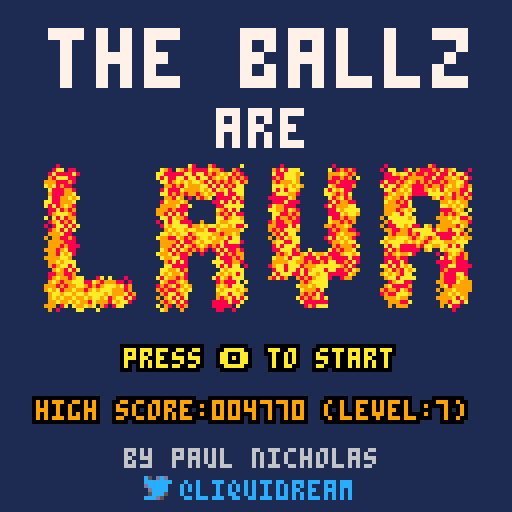
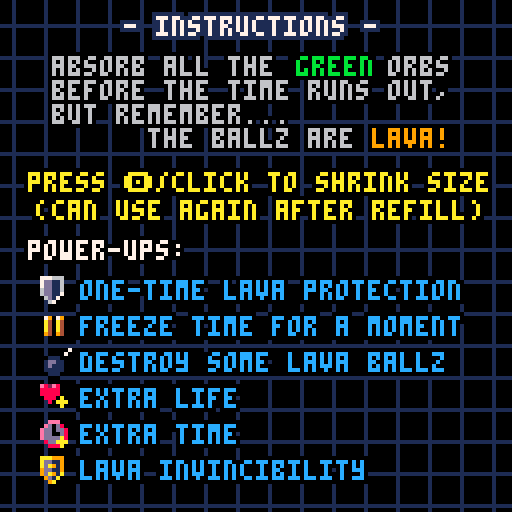
My entry to the #FC_JAM that came 2nd Place, where the theme was "Union".
For the best experience, download or Click here to play on Itch.io, coz it can hide the mouse cursor!
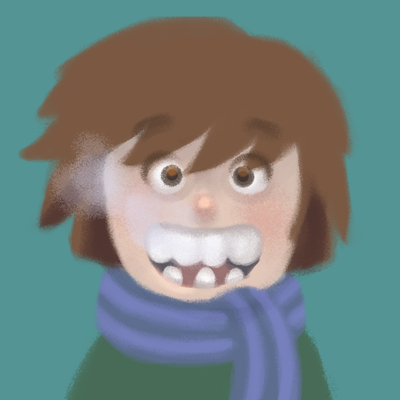


My first cartridge!
I might use it before some other cartridge I make in the future, though it's a little too long, I probably gonna make a simple version for that. The code is unnecessarily verbose, but I like it that way. It's a self-contained function of roughly 325 tokens and kinda heavy on sprites as well.
This is a little game I made for the Fantasy Console Game Jam.
It stars Gerald the Glue Bottle, who must unite the panicking creatures to rescue them.
Score as many points as possible, and try to get a combo!
Here's a link to the itch.io page:
https://jclermont.itch.io/dungeon-of-unity
This is a little game I made for the Fantasy Console Game Jam.
It stars Gerald the Glue Bottle, who must unite the panicking creatures to rescue them.
Score as many points as possible, and try to get a combo!
Here's a link to the itch.io page:
https://jclermont.itch.io/dungeon-of-unity

So I went a little crazy after doing my contribution for the invent a title screen thread. I thought it would be nice if the two Gs drew at the same time and I came to the conclusion (in a huge leap) that the best way of doing it would be to some kind of co-operative multitasking co-routine system.
It doubled the token count from 200ish to 400ish but I'me pretty happy with it and I think it works well as a demonstration of the power of closures and co-routines.
EDIT: So the library is based around additive drawing - there is no clearing of screen state between each frame so everything builds up. My next plan is to build a "display list" system when you can attach co-routines to properties of each display item to animate them - more flexible than this current system.
If you copy "\128" to the clipboard, and then paste it back, you get a solid block character instead of the 4-character escape sequence. Somewhere in the paste handler, it's actually converting the escape sequence.
Oddly, it only does this if the value is 128 or higher. Pasting "\127" works fine.
Also, it doesn't happen with hex escape codes, so "\x80" works fine.
(As an aside, the bug where you can't use the Del key at the first character of the buffer is still there too...)
I needed a filter for something on another project, so I implemented the very cool 1 euro filter from:
http://cristal.univ-lille.fr/~casiez/1euro/
The parameters are tuned in this gif to make it very obvious, but its controllable.
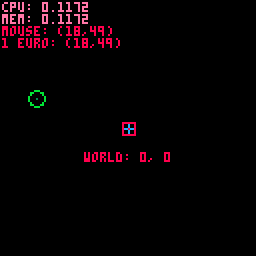
The code for the filter is at the top of the cart, if you want to see the source. It has a :filter() method that can filter the incoming noisy value.
In the cart: if you click it draws lines. Green line is the input signal, yellow is the filtered signal.
Based on stdlib.p8, built with @stevelavieties.
I got a lot of comments about my smooth camera transitions in a recent WIP that I posted. I thought I'd just go ahead and share how I did it with a code sample cart. I'm posting the important function below, but feel free to look at the cart's code to see how it's implemented. I'm not a wizard, and I know it could probably be simplified somehow, so feel free to use and improve as you see fit. If you do improve it, let me know here so I can update the code for others to see!
function smooth_cam(spd) cam_x+=(flr(p.x/128)*128-cam_x)*spd cam_y+=(flr(p.y/128)*128-cam_y)*spd if (abs(cam_x-flr(p.x/128)*128)<0.5) cam_x=flr(p.x/128)*128 if (abs(cam_y-flr(p.y/128)*128)<0.5) cam_y=flr(p.y/128)*128 camera(cam_x,cam_y) end |


It feels eerily similar.
It even uses the term "Fantasy Game Console". It looks like it has more features than Pico-8, but for less.



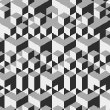






 3 comments
3 comments



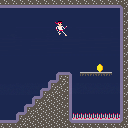
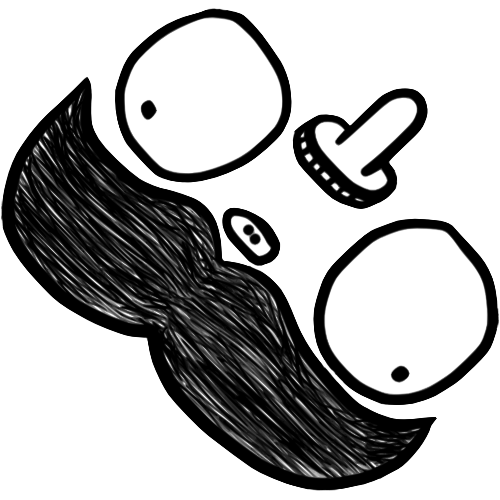
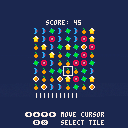
.jpg)

